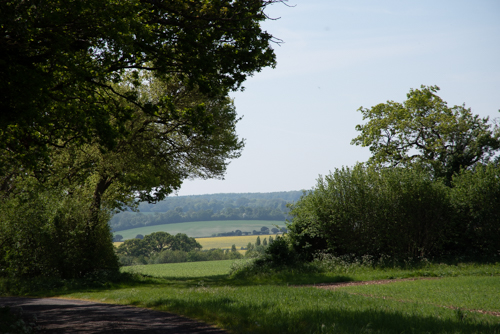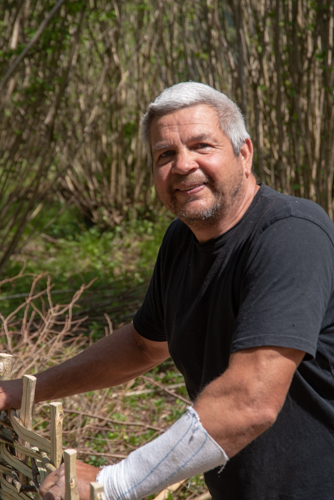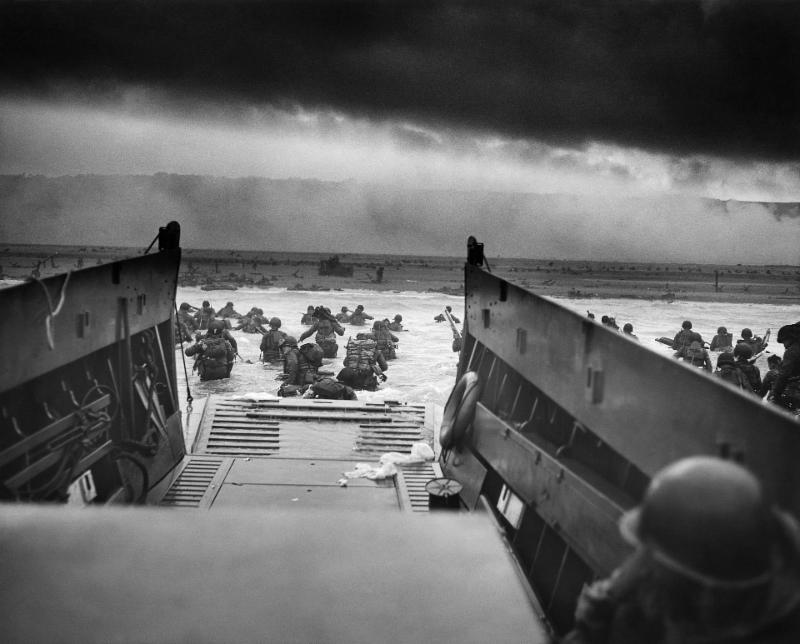|
The view of the Wattle
Man
Greetings!
I went
up to see my old friend Trevor the hurdle maker a fortnight ago. He was
some weeks late (and still is .....) in completing an order and mobile
phones are not exactly his thing. And anyway it's always good to catch up
and it's a lonely life being a wattle man.
 This is the view from
Trevor's office, if that is what you want to call a clump of a few hundred
acres of woodland folded into the Hampshire downs just east of Stockbridge.
On the sunny mid-May day I visited the last of the bluebells were fading
and the surrounding fields vivid yellow. It was as perfect a spring day as
you can get. 'Enjoy it while you can,' says Trevor. I know what he means.
I've been up here in all seasons, a place that has precisely zero creature
comforts. Winter business is conducted in the front seats of Trevor's
battered car. But today the weather Gods are smiling on us or at least I
thought so until Trevor delivered his verdict in answer to my question as
to how things were. 'Terrible,' he said, 'It's this global warming. This is the view from
Trevor's office, if that is what you want to call a clump of a few hundred
acres of woodland folded into the Hampshire downs just east of Stockbridge.
On the sunny mid-May day I visited the last of the bluebells were fading
and the surrounding fields vivid yellow. It was as perfect a spring day as
you can get. 'Enjoy it while you can,' says Trevor. I know what he means.
I've been up here in all seasons, a place that has precisely zero creature
comforts. Winter business is conducted in the front seats of Trevor's
battered car. But today the weather Gods are smiling on us or at least I
thought so until Trevor delivered his verdict in answer to my question as
to how things were. 'Terrible,' he said, 'It's this global warming.
 Trevor has coppiced
these hazel woods for thirty years. It's a seven year rotation from one
harvest to the next, each hazel growth largely used for making hurdles. The
upright stems are cut from the stools, which are 2-3 centuries old, with a
bill hook, a sort of curved hand axe and left for a few weeks or months
depending on the time of year to allow the sap to run out, at which point
they are split longways in two. The process of making a hurdle (Trevor can
produce two or three a day) is done entirely by hand and without the use of
any material other than hazel. There are no nails. No wires. Simply
twisting and flexing the hazel in manner of construction that is both rigid
and pliable. A good hurdle, originally used around southern England for
folding sheep in temporary enclosures, will last a decade or more despite
being constantly uprooted, moved, abused by the sheep and subjected to the
downland weather. Trevor has coppiced
these hazel woods for thirty years. It's a seven year rotation from one
harvest to the next, each hazel growth largely used for making hurdles. The
upright stems are cut from the stools, which are 2-3 centuries old, with a
bill hook, a sort of curved hand axe and left for a few weeks or months
depending on the time of year to allow the sap to run out, at which point
they are split longways in two. The process of making a hurdle (Trevor can
produce two or three a day) is done entirely by hand and without the use of
any material other than hazel. There are no nails. No wires. Simply
twisting and flexing the hazel in manner of construction that is both rigid
and pliable. A good hurdle, originally used around southern England for
folding sheep in temporary enclosures, will last a decade or more despite
being constantly uprooted, moved, abused by the sheep and subjected to the
downland weather.
There is a whole raft of
terms Trevor recites as he makes the 6ftx3.5ft panel. Uprights sail. Weaving
rods. Windings. Jonny spur stabber. Finishing rod. His hands are both
hammer and pliers as he weaves and compacts. It is sort of fun to have a
go, but I'm not sure I could do it day in, day out.
Today there is little
demand from the sheep farmers for hazel hurdles or house builders (think
wattle and daub) but Trevor is busier than ever. 6ftx6ft panels make for
popular fences. Garden centres have an insatiable demand for decorative
panels in all manner of sizes for all manner of uses. So why so gloomy? How
could the centuries old tradition of hurdle making be affected by global
warming? It is all about growth rates and the pattern of growth.
|
|
|
|
A
centuries old hazel stool
|
|
No longer is the
rotation seven years; it is coming down to something closer to five. The
reason? The lack of cold winters. In Trevor's first two decades the hazel
grew for seven months of the year and was dormant for five, the sap rising
and falling with the change of the seasons. But now there is no dormant
period. The hazel keeps growing, even if only ever so slightly, all year
round. Now you might think that no bad thing. More growth equals the
potential for more money. But the problem is that the growth is too fast.
The dormancy is an essential part of ensuring strong and pliable hazel
stems. In short, there is more of the raw material, but it is not as good.
This upsets Trevor. He
knows in his heart his 21st century hurdles won't last as
long as those he made in the 20thcentury. It is not his fault.
And in truth it won't be the end of the world if his panels last ten years
instead of fifteen. But it's an ever so subtle clue that, regardless of the
reasons, nature is changing.
The
Frankel book: delayed at the start
About
this time I was confidently expecting to be shooing the moths from my
morning suit in preparation for a whirly gig of PR as my Frankel book was
launched in the run up to Royal Ascot. Sadly, it is delayed for a full
year.
 It was always going to
be a tight deadline; to a certain extent writing the book is the easy part.
Preparing the 100,000 or so words for publication is a whole different
thing. Editing, fact checking, manuscript approval, cover design, proof
reading, indexing, typesetting and not to mention getting your allotted
time on the William Collins printing presses all play a part. In the end we
just ran out of road; not the happiest call I have had this year. It was always going to
be a tight deadline; to a certain extent writing the book is the easy part.
Preparing the 100,000 or so words for publication is a whole different
thing. Editing, fact checking, manuscript approval, cover design, proof
reading, indexing, typesetting and not to mention getting your allotted
time on the William Collins printing presses all play a part. In the end we
just ran out of road; not the happiest call I have had this year.
You might ask why we
didn't simply push the publication date a month or two later. Well, there
were two lines of reasoning. The first was that Royal Ascot is, aside from
the Grand National, the best time of year to catch the eye of a public that
is interested, but doesn't regularly engage with, horse racing. Likewise,
media editors in print, TV and radio, are more receptive to horseracing
stories that feed into the Royal meeting vibe. In short, it is too good a
PR window to pass up.
As for just later in
this year, well summer is somewhat problematic with holidays and such. Push
on into the autumn and my book would have been swamped by super Thursday
(all books are published on a Thursday, don't ask me why) when the
Christmas headline authors, celebrities, chefs and their like, are rolled
out to catch the Christmas wave.
So, it is now going to
be May 2020 for me. Guess I just better get on with the next book in the
meantime .....
Last
minute spaces for Father's Day & River Walk with Simon Cooper
 I have
some last minute slots due to changes of plans: I have
some last minute slots due to changes of plans:
I have three spaces left
for a Father & Child on the afternoon event (2pm-5.30pm) at Nether
Wallop Mill. £125. Tuition, tackle and flies provided. Take home two fish!
Join me for a visit to
the Leckford Eel Traps, Halford's Oakley Hut at Mottisfont Abbey and the
water meadows. Meet at The Peat Spade, Longstock for coffee and an
illustrated talk. Return after all the above for lunch at 2.30pm. Three
places left. £75 for one. £125 for two.
Fishing
Breaks is recruiting
Fishing
Breaks has a full-time vacancy based at Nether Wallop Mill in Hampshire.
In broad
terms the position will entail working in the office for the majority of
the week in a general sales/marketing role liaising with customers, river
owners, river keepers and guides. The remaining time will be split between
guiding/instructing and assisting our river keeper with weed cutting,
restoration projects and general duties, plus holiday cover. The vacancy
requires good computer/administrative skills and an excellent telephone
manner. A recognised guiding/instruction qualification is a requirement as
is a full driving licence.
The work
will primarily be Monday-Friday with occasional weekends. Please reply with
your CV and a covering letter to vy email to Simon Cooper simon@fishingbreaks.co.uk Applications
close 10/June. Interviews will take place w/s 17/June.
PS Diane is not leaving
and nor am I retiring. We just need some help!
Feedback
Draw winner for May
Another Mayfly season is
drawing to close. In its own way that is rather sad. We spend months in
anticipation and then its gone. June is always something of a readjustment
but long, dusky evenings should be temptation enough over the
summer to come.
Well done to Colin
Fairley, who fished on our new beat at Steeple Langford on the River Wylye,
the winner of the recently published River
Itchen at Martyr Worthy by George Edward Mann which I review in
the July edition of Trout
& Salmon.
If you wish to buy a
copy of George's book, which follows in the footsteps of legendary Itchen
keeper Ron Holloway, you may do so direct via his web site at £35.
The
Quiz
As we
celebrate the 75th anniversary of D-Day this week a few related
questions. As ever, it is just for fun, with answers at the bottom of the
page. One little bit of wartime trivia before you do the mental deep dig.
 If you are familiar with
Bullington Manor you will know that near the top of Beat 2, just below the
white road bridge, there is a pool we call the Tank Trap. If you are familiar with
Bullington Manor you will know that near the top of Beat 2, just below the
white road bridge, there is a pool we call the Tank Trap.
This was in fact created
by tanks travelling from Salisbury Plain to Portsmouth in to join the D-Day
convoy. The bridge was too weak and too narrow so they diverted to the
right, fording the river, the tracks cutting out the pool which remains
today.
1) Which American General,
later a US President, fished the River Test in May 1944?
2) What does the term D-Day
denote?
3) How many Allied
beachheads were established on the Normandy coastline?
Enjoy the weekend.
Best wishes,
Founder & Managing Director
Answers:
1)
General Dwight D. Eisenhower 34th U.S. President.
2)
D-Day is a general military term for the day on which an operation or
exercise is planned to commence.
3)
Five. Utah, Omaha, Gold, Juno, and Sword.
|
No comments:
Post a Comment